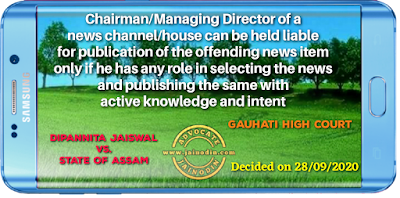Learned Amicus Curiae for the respondent/complainant in Criminal Revision Petition Crl.R.P.No.152/2014, in her argument stating that the pleadings filed in a Court and the deposition given in a Court of Law are not privileged one and further stating that a pleading filed in the Court also amounts to publication, has relied upon few judgments in her support as follows.
In the case of Smt. Madhuri Mukund Chitnis Vs. Mukund Martand Chitnis and another reported in 1990 CRL.L.J. 2084, the Bombay High Court was pleased to observe that, the imputations made in a proceeding which is filed in a Court is clearly a publication. It further observed that even a publication to an authority over the person against whom the imputations are made must be held to be sufficient publication which falls within the purview of the said Section 499 of IPC.
In the case of M.K. Prabhakaran and another Vs.T.E. Gangadharan and another reported in 2006 CRI.L.J. 1872, the Kerala High Court, in a matter where it is alleged that defamatory statements against complainant were made in a written statement filed before the Court held that,
In the case of Sanjay Mishra Vs. Government of NCT of Delhi & another, the Delhi High Court in paragraphs 11 and 12 of its judgment was pleased to observe as below:-
"11. In Sandyal V.Bhaba Sundari Debi 7 Ind.Cas.803:15 C.W.N. 995:14 C.L.J.31 the learned Judges, following the case of Augada Ram Shaha V. Nemai Chand Shaha 23 C.867;12 Ind.Dec.(n.s.)576, held thatdefamatory statements made in the written statement of a party in a judicial proceedings are not absolutely privileged in this country, and that a qualified privilege in this regard cannot be claimed in respect of such statements, unless they fall within the Exceptions to Section 499 of the Indian Penal Code. Undisputedly, the case of the petitioner was not in any of these Exceptions.12. For criminal purposes "publication" has a wider meaning than it has in civil law, since it includes a communication to the person defamed alone.The prosecution for defamation in criminal cases can be brought although the only publication is to the person defamed as it is very likely to provoke a breach between the persons involved...."
In the case of Thangavelu Chettiar Vs. Ponnammal reported in AIR 1966 Mad 363, the Madras High Court was pleased to observe that, there can be no doubt that the defamation contained in the plaint was published by the plaint being filed in the Court.[Para No.15]



